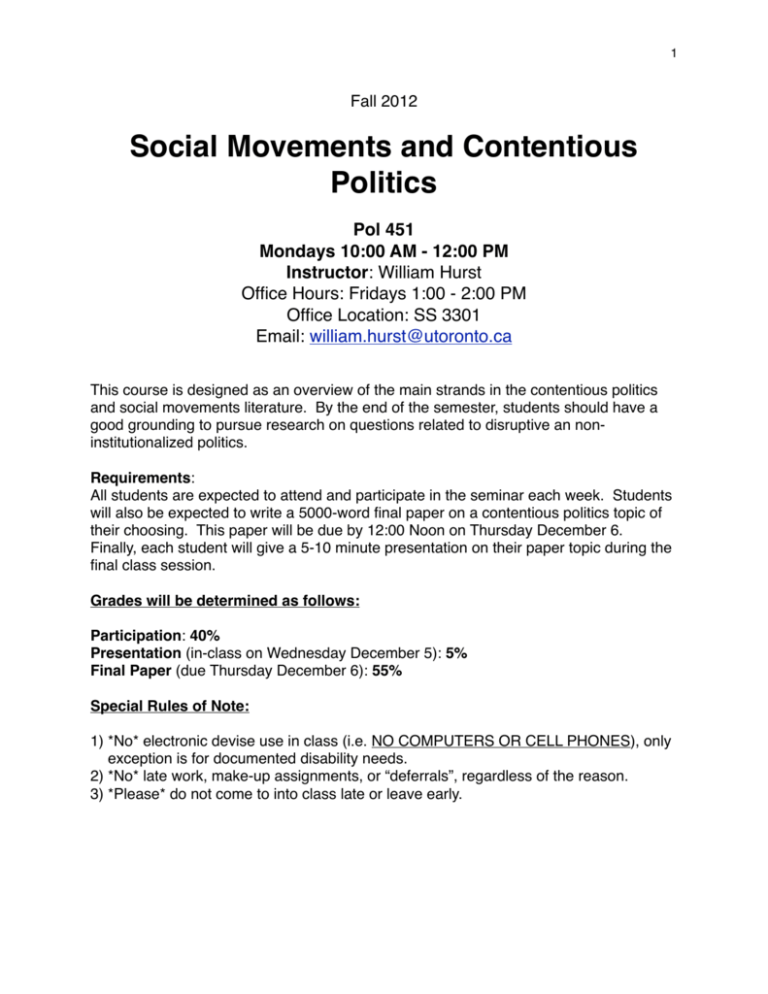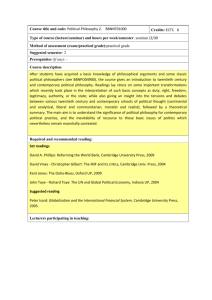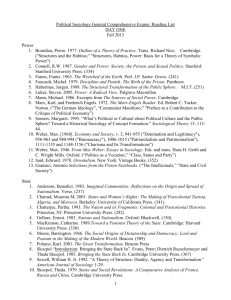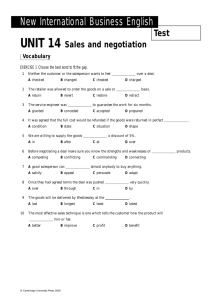Contentious Politics Syllabus.Toronto
advertisement

1 Fall 2012 Social Movements and Contentious Politics Pol 451 Mondays 10:00 AM - 12:00 PM Instructor: William Hurst Office Hours: Fridays 1:00 - 2:00 PM Office Location: SS 3301 Email: william.hurst@utoronto.ca This course is designed as an overview of the main strands in the contentious politics and social movements literature. By the end of the semester, students should have a good grounding to pursue research on questions related to disruptive an noninstitutionalized politics. Requirements: All students are expected to attend and participate in the seminar each week. Students will also be expected to write a 5000-word final paper on a contentious politics topic of their choosing. This paper will be due by 12:00 Noon on Thursday December 6. Finally, each student will give a 5-10 minute presentation on their paper topic during the final class session. Grades will be determined as follows: Participation: 40% Presentation (in-class on Wednesday December 5): 5% Final Paper (due Thursday December 6): 55% Special Rules of Note: 1) *No* electronic devise use in class (i.e. NO COMPUTERS OR CELL PHONES), only exception is for documented disability needs. 2) *No* late work, make-up assignments, or “deferrals”, regardless of the reason. 3) *Please* do not come to into class late or leave early. 2 Class Meeting Agenda: Week 1 (September 10): Introduction and Ground Rules Week 2 (Septemebr 17): Conceptualizing Contention and Movements Readings: Jocelyn A. Hollander and Rachel L. Einwohner, “Conceptualizing Resistance,” Sociological Forum 19:4 (2004): 533-54 AND Doug McAdam, “Conceptual Origins, Current Problems, Future Directions,” in McAdam, McCarthy, and Zald, Comparative Perspectives on Social Movements (Cambridge, 1996), pp. 23-40 (available on blackboard) AND Michael Lipsky, “Protest as a Political Resource,” American Political Science Review 62:4 (1968): 1144-58 Week 3 (September 24): The Classical Resources-Opportunities Paradigm Readings: Sidney Tarrow Power in Movement: Social Movements and Contentious Politics Cambridge: Cambridge University Press, 2011 (3rd Edition). Week 4 (October 1): Older Variants Readings: Theda Skocpol States and Social Revolutions Cambridge: Cambridge University Press, 1979. AND Ted Gurr “A Causal Model of Civil Strife: A Comparative Analysis Using New Indices” The American Political Science Review 62:4 (1968): 1104-1124. AND Ted Gurr “Psychological Factors in Civil Violence” World Politics 20:2 (1968): 245-278. [OCTOBER 8 = THANKSGIVING] Week 5 (October 15): Culture, Agency, and Contingency: Lacunae in Studies of Contentious Politics Readings: James Jasper The Art of Moral Protest, Culture, Biography, and Creativity in Social Movements Chicago: University of Chicago Press, 1997. AND Aminzade et al. Silence and Voice in the Study of Contentious Politics Cambridge: Cambridge University Press, 2001. 3 Week 6 (October 22): Rationalist Alternatives Readings: Macur Olsen The Logic of Collective Action Cambridge MA: Harvard University Press, 1965. AND Mark Lichbach The Rebelʼs Dilemma Ann Arbor: University of Michigan Press, 1998. Week 7 (October 29): A New Paradigm? Readings: McAdam, Tarrow, and Tilly The Dynamics of Contention Cambridge: Cambridge University Press, 2001. Week 8 (November 5): Frames, Framing, and New Room for Grievances Readings: Hank Johnston and John Noakes eds. Frames of Protest: Social Movements and the Framing Perspective Lanham: Rowman & Littlefield, 2005 (Chapter 1, and at least 3 other chapters). AND Snow, Rochford, Warden, and Benford “Frame Alignment Processes, Micromobilization, and Movement Participation” American Sociological Review 51:4 (1986): 464-481. AND David A. Snow et al., “Disrupting the Quotidian: Reconceptualizing the Relationship Between Breakdown and the Emergence of Collective Action,” Mobilization 3:1 (1998): 1-22. AND William Hurst “Mass Frames and Workersʼ Protests” in OʼBrien (ed.) Popular Protest in China pp. 71-87 (available on blackboard). AND William Hurst & Kevin OʼBrien “Chinaʼs Contentious Pensioners” The China Quarterly 170 (2002): 345-360. [NOVEMBER 12 = FALL BREAK] Week 9 (November 19): Mobilizing Structures, Cognitive Liberation, & the Politics of Space and Place Readings: Dingxin Zhao, "Ecologies of Social Movements: Student Mobilization during the 1989 Prodemocracy Movement in Beijing," American Journal of Sociology 103:6 (May 1998):1493-1529 AND Doug McAdam Political Process and the Development of the Black Insurgency, 1930-1970 Chicago: University of Chicago Press, 1999 (2nd edition). AND All articles in Special Issue of Mobilization 8:2 (2003) on “space and contentious politics”. 4 Week 10 (November 26): Elite Allies and Strategic Divisions Readings: Vincent Boudreau Resisting Dictatorship: Repression and Protest in Southeast Asia Cambridge: Cambridge University Press, 2004. AND Kevin OʼBrien & Li Lianjiang Rightful Resistance in Rural China Cambridge: Cambridge University Press, 2003. Week 11 (December 3): Tactics, Repertoires, and State Responses Readings: Charles Tilly Regimes and Repertoires Chicago: University of Chicago Press, 2006. AND Doug McAdam, “Tactical Innovation and the Pace of Insurgency,” American Sociological Review 48 (December 1983): 735-54 “Make-Up Session” (December 5): Presentations PAPERS DUE (HARD COPY IN DEPT. MAILBOX) BY 12:00 NOON ON THURSDAY DECEMBER 6 **LATE PAPERS NOT ACCEPTED**









